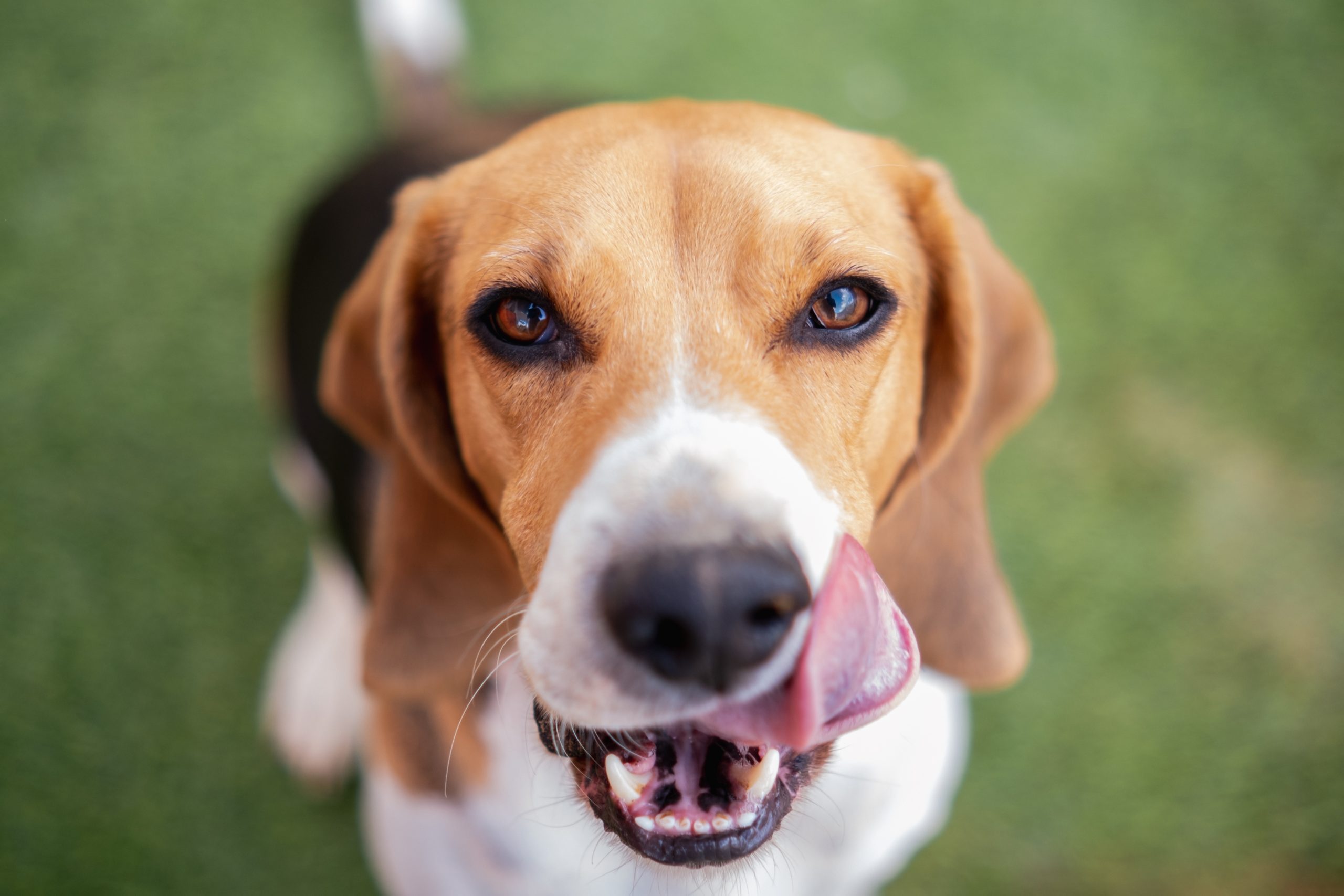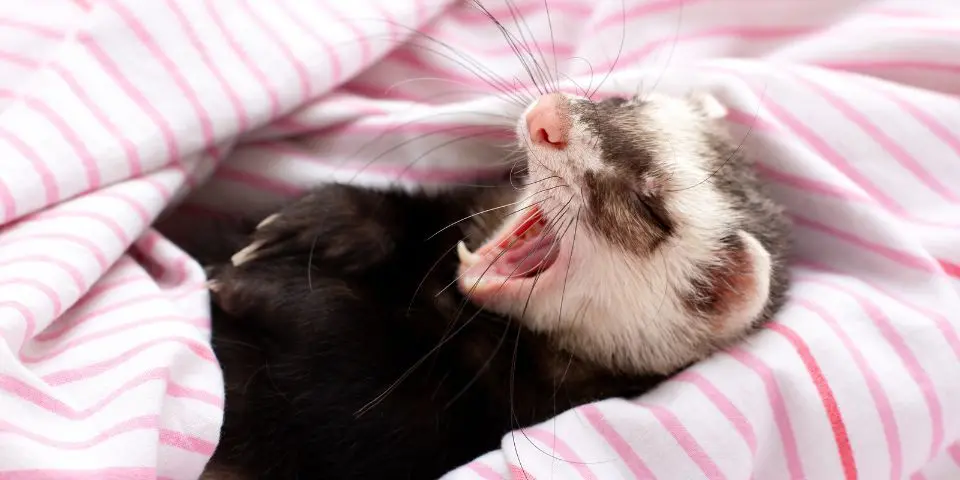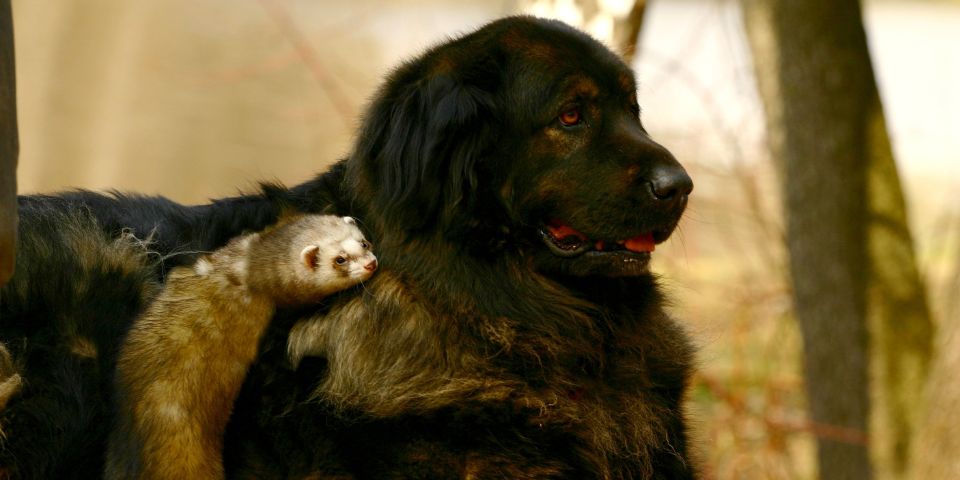Author: Haley Pearson | The Modern Ferret
Once you bring a ferret into your home, they become part of your family. It’s only natural to want to include your new pet in all aspects of daily life. This includes a natural desire for your new ferret pet to become best friends with the family dog! However, there are important considerations to keep in mind when determining whether this is a good idea to pair dogs with ferrets and vice versa.
This article will cover:
- Dogs not compatible with ferrets
- Ferrets not compatible with dogs
- How to safely introduce dogs and ferrets that are well suited for one another
Factors That Affect a Dog’s Compatibility with Ferrets
There are many factors to consider when deciding whether or not a ferret and a dog can safely coexist. On the dog’s side, important factors determining whether your family dog can safely play with ferrets include:
- Breed
- Personality
- Age and health
 Dog Breeds that Shouldn’t Be Around Ferrets
Dog Breeds that Shouldn’t Be Around Ferrets
While it’s important to assess a dog’s unique personality, it’s equally as important to understand breed-specific traits.
Before Fido joined your gentle, fun-loving family, were they in fact bred to hunt? The rat terrier, for example, was originally created to kill animals like rats and mice. Even though ferrets are not part of the rodent family, they can still exhibit strikingly similar characteristics in the way they carry themselves.
With the wrong dog, a ferret’s instinctual behaviors could trigger predatory instincts at a moment’s notice, possibly leading to serious injury requiring veterinary care, or even death. For this reason, there are certain breeds of dogs that cannot be trusted around smaller animals like ferrets.
Here is a short list of dogs to keep far away from ferrets:
- Terriers
- Pointers
- Setters
- Beagles
Dog Personality Traits That Don’t Fit With Ferrets
Beyond a dog’s breed, it is also important for prospective ferret owners to take a look at its unique personality. Even if your dog was not bred to hunt small animals, you still might find them to be surprisingly aggressive. Ask yourself this: how has your dog acted toward smaller animals in the past?
Watch out for these telltale signs of an aggressive dog:
- They hunt neighborhood animals like cats, birds, rabbits, and rodents
- They stalk or pace around a small animal cage
- They lunge, snap or nip at small animals
Another personality trait to watch out for is territorial or possessive behavior in dogs. How does your dog respond when another animal takes one of its prized possessions? Ferrets are famous for taking things and hiding them away in various places around the house. If your dog is prone to aggression if his favorite toy goes missing, then a ferret might not be the best choice for your family.
Age and Health Considerations of Dogs and Ferrets
A dog’s years of age and possible health conditions can also determine whether they would enjoy interacting with a ferret or become stressed by the reality of sharing their home.
Older dogs who spend many hours a day sleeping may not appreciate the attention of young ferrets nipping at their ears to play.
Similarly, a sick dog who is focused on recovery may not want to entertain an energetic ferret either. It’s important to respect the wishes of any vulnerable pet, big or small!
Issues may arise on the other side of the spectrum as well. Do you have a large, clumsy puppy traipsing around your home? Younger dogs are often still figuring out body coordination. Without realizing it, they could easily step on your unsuspecting ferret and injure or kill them.
Here is a list of not-so-ideal pairings:
- An older dog with a baby ferret
- A sick dog with an energetic ferret
- A large, clumsy puppy with a slower ferret
 Ferret Personality Traits That Don’t Fit With Dogs
Ferret Personality Traits That Don’t Fit With Dogs
Some ferrets are not good candidates to form a friendship with a dog. If your ferret has happily spent most of his life as the sole household pet, for example, he may be reluctant to share his home (or owner) with someone else.
If your ferret exhibits territorial behavior such as aggression toward other animals, this may be another sign that he is not likely to open his home to another furry friend (dog or otherwise).
Another important consideration to keep in mind is the health and age of your ferret. If a ferret is older, slower, or sick, he may also find the company of a curious, persistent dog irritating.
Also, due to the size discrepancy between a larger dog and a ferret, this dynamic might be especially frightening for a particularly vulnerable ferret too.
Introducing Dogs and Ferrets to One Another
If you feel confident that neither your dog nor your ferret fit into any of the categories listed above, you may be wondering how to safely introduce each animal and foster a safe, mutually beneficial relationship.
The key is to start slow and to always keep safety as your number one priority. Here are some helpful tips:
- Tip #1: Begin your introductions on neutral ground such as a common area in the home or in a fenced-in outdoor space so neither animal feels the need to defend their territory.
- Tip #2: Use a reward system to encourage positive behavior, like bravery on your ferret’s part! This is a great opportunity to utilize Oxbow’s Real Prey Rewards.
- Tip #3: Give your ferret an easy way to flee to safety by providing a play tube or Oxbow’s Customizable Play Place.
- Tip #4: Take your time and build up to longer and longer interactions together over the course of several weeks.
- Tip #5: Always supervise interactions between your ferret and dog, no matter how comfortable they become with one another!
 Signs of a Successful Introduction Between Ferrets and Dogs
Signs of a Successful Introduction Between Ferrets and Dogs
If your ferret and dog appear to be getting along well, this is cause for celebration. Look for these signs as ‘green lights’ to keep going:
- Your ferret confidently greets your dog
- Your ferret and dog gently sniff one another
- Your ferret and dog begin to engage in play like chasing or light wrestling
- Your ferret begins to ‘war dance’ or make ‘dooking’ noises while interacting with your dog
- Your ferret and dog choose to sleep near each other after playing
Signs of an Unsuccessful Introduction Between Ferrets and Dogs
Not all ferrets are going to welcome a dog into their life, regardless of what you do to facilitate a friendship. Here are some signs to look out for that tell you to slow down or reevaluate the introduction process:
- Your ferret runs away and hides at the sight of your dog (even after several weeks of introductions)
- Your ferret poops and pees on himself while ‘playing’ with your dog
- The play-fighting becomes aggressive and you notice blood
- Your ferret audibly screams (different than ‘dooking’)
Conclusion
In a perfect world, every ferret would find the perfect playmate in every single dog, big or small, young or old. However, in reality, there are many important deciding factors that determine whether such a relationship is even possible.
As stated above, pay attention to your dog’s breed, watch for special tell-tale behaviors, and keep in mind the age and health of both your ferret and dog before even giving this potentially adorable friendship a try.
And above all, keep the welfare and safety of both pets as your highest priority.

About the Author: Haley Pearson is the founder of The Modern Ferret, a global social media community centered around celebrating ferrets and educating new ferret owners. Her Youtube channel has almost 60,000 subscribers and she runs a Tiktok account with over 900,000 followers! Haley lives in Lincoln, Nebraska, with her rescue ferret, Elijah. When she isn’t making Youtube videos about ferrets Haley loves to serve at her local church.
